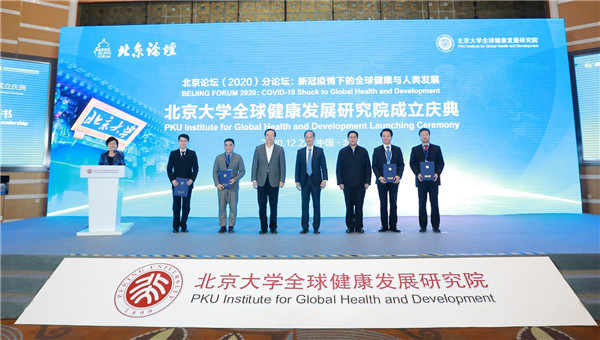Peking University, December 24, 2020: The global spread of COVID-19 poses an unprecedented challenge to global health security, and the fate of humanity has never been more closely intertwined. It is thus urgent to find solutions to the crisis through global cooperation. To this end, Peking University Institute for Global Health and Development (PKU-iGHD) was officially launched on December 22. The board of directors of PKU-iGHD is chaired by Zhan Qimin, executive vice president of Peking University and president of Peking University Health Science Center. The dean of PKU-iGHD is Gordon Liu, Boya professor and deputy head of the Faculty of Economics and Management at Peking University.

PKU-iGHD will be developed into a unique global health-oriented institution for research and education that will foster multidisciplinary and interdisciplinary cooperation, spearhead the development of disciplines, and integrate research, teaching and services. PKU-iGHD, which will be based in China, aims to integrate various advantages of Peking University and domestic and foreign resources to implement Healthy China Initiative and Global Health Strategy.

Gordon Liu delivers a speech at the launching ceremony
In terms of the development of disciplines, PKU-iGHD will adopt various innovative approaches such as dual appointment, part-time employment and global recruitment so as to form a first-class team with multiple centers and research groups across multiple disciplines, which spans areas of research, teaching and think-tank services. PKU-iGHD will launch a global recruitment process to bring in interdisciplinary talents in emerging and frontier disciplines, and establish postdoctoral research stations. PKU-iGHD will also recruit master and doctoral students from home and abroad, and train global health leaders, senior researchers and diplomats in the areas of global health through joint training across global universities, cross-disciplinary teaching and multicultural edification.
The goal of PKU-iGHD is to cultivate new interdisciplinary talents with a global perspective and a humanistic background, who can systematically master basic theories, knowledge and skills required for medicine, public health, humanities and social sciences and other disciplines related to global health. They will also possess the skills necessary for scientific research and innovative practice, as well as competencies in communication and coordination needed to lead research, policy evaluation, policy advocacy, and international resource coordination and action in the field of global health.
Source: Peking University Institute for Global Health and Development, The Paper (Chinese)